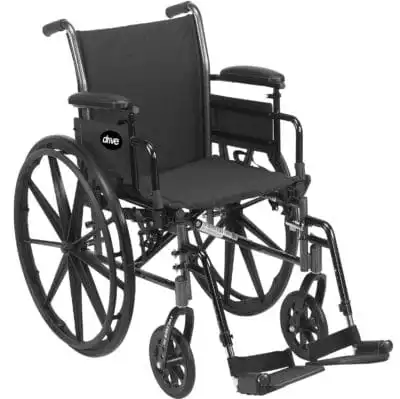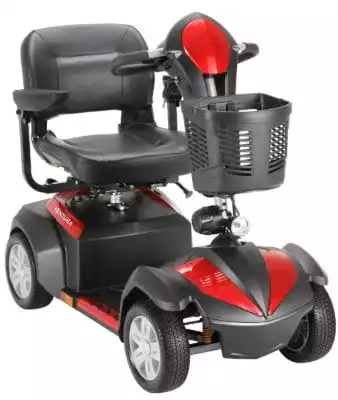
If you find yourself in need of a wheelchair for mobility, it’s important to choose one that suits your lifestyle. Manual and electric wheelchairs each have their own advantages and disadvantages, and whether or not you should use one depends on your unique condition.
What works for a patient with neurological complications that cause widespread weakness, such as multiple sclerosis, is likely to be much different from, say, a patient recovering from a broken spine. Both decisions require careful consideration.
In most cases, your care team will handle any questions you may have about choosing the right chair. You should still investigate your options on your own, too, if only so that you’re informed once it’s time to decide. When choosing between a manual wheelchair and an electric wheelchair, keep the following factors in mind.
Cost
Manual wheelchairs are less expensive than electric, and thus, are much more likely to be covered by insurance plans at every level. Typically, insurance plans will only cover an electric wheelchair if your doctor somehow believes that using a manual chair would negatively impact your health.
If you need a power chair (based on other factors), but cannot afford one, or if your insurance company will only cover a manual chair, speak with your doctor. He or she may consult directly with the insurance company to advocate for full coverage.
When insurance isn’t a concern, you have a bit more freedom to decide based on your own personal needs. If you don’t need your wheelchair full-time, a manual chair is by far the more cost-effective option. If you do need your chair full-time, aim for a power chair instead. It will pay for itself over time in increased comfort and ease of use.
Portability and Transportation
Generally speaking, manual wheelchairs are much more portable than electrics as you can fold them up and or disassemble them for easy storage in a vehicle. This factor also makes them easy for caregivers to stash under beds or in closets during the night, or when not in use.
That isn’t to say that a power chair can’t be portable. There are options that can be disassembled for storage as well. The problem lies not in how unwieldy they are but in their increased weight because of the battery and motor systems inside them. Electric wheelchairs are universally heavier than manual chairs, giving manual chairs the advantage when it comes to portability.
Consider how often you use other modes of transportation. If you travel frequently by car or van, it may not be possible to load an electric wheelchair, whereas a manual chair can be folded and stowed, possibly without assistance. A vehicle with a chair lift can handle either, so keep availability and cost of such a vehicle in mind.
Ease of Access
While disability accessibility continuously improves, you still cannot navigate all public areas easily by wheelchair. Raised curbs, poorly-maintained or improperly-graded ramps, and narrow doorways can be daunting to manage with a manual wheelchair, unless you have someone to assist you.
While power chairs are more convenient for dealing with obstacles, they certainly aren’t perfect. The heavier weight makes them even more difficult to get free if they do become wedged, especially on your own.
Also keep in mind that if you need to be able to travel longer distances, you’ll need to account for battery life as well as the terrain. When considering an electric wheelchair, consider the distance that you will need to be able to travel before recharging.
Conversely, traveling long distances in a manual chair may be fine for someone in good physical shape, but may not be suitable for someone who lacks upper body strength. Self-propelling your chair demands energy; it’s okay to admit that you need a little assistance from technology.
Personal Independence
Do you live on your own, or do you have a care provider, family member, or other assistance day-to-day? Will you need someone to push your chair for you when a grade is too steep, or a curb too high? What if you need to carry something in your hand while traveling? These are important questions for elderly and infirm wheelchair users, especially when choosing a new chair.
For those who need more independence in transportation and daily activities, a manual wheelchair may be a poor choice. The energy demand can be self-limiting, and for some patients, leaving the house can become more of a chore than something to look forward to.
An electric wheelchair offers more support and freedom by allowing you to go out and handle errands or seek entertainment with technology by your side. But they’re also more difficult to push, so manual chairs are the real winner here for caregiver interactions.
Exercise Ability and Needs
Propelling a manual wheelchair throughout a busy day can be very tiring, and only more so for people with fatigue, or other conditions limiting endurance, such as COPD. For those with chronic pain (such as arthritis) affecting the upper body, arms, or hands, use of a manual wheelchair may not be advised for extended periods, if at all. You should consult your doctor if you’re not sure whether this applies to you.
Even if you aren’t affected by conditions that cause fatigue or pain, you should still consider how much travel you’ll be doing by wheelchair. If you’re a student, how long would it take you to get from one class to the next? Employees, how long to get from your desk to a meeting, or to your car after work? How many times per day do these trips happen, and how do they affect your ability to concentrate when you reach your destination?
On the other hand, staying as healthy as you can despite your wheelchair use is important. Experts often recommend that capable patients use manual chairs whenever possible because it exercises the upper body and torso. Wheelchair exercises make it possible to work out without needing to stand.
If you’re interested in adaptive sports, you will need that exercise to condition yourself for the activity. An electric wheelchair is not permitted in these sports, so a good, competition-level approved manual chair is a must.
Maintenance Requirements
An electric wheelchair requires more maintenance than a manual chair, so if you choose a power chair, you should expect to recharge it semi-regularly. Extra batteries help with this, and will allow you to occasionally replace the battery for a fresh one.
Remember --- if the battery runs out of power, you can’t just start using it as a manual chair. Most power chairs don’t provide any way to manual propel them, and are too heavy to operate in this fashion, anyway.
Most importantly, as with any machine, you will need to repair or otherwise maintain the motor or control systems, too. If your chair warranty runs out, or you accidentally break it, that can become a very costly endeavor for power chair users.
A breakdown can leave you stranded without a chair, so some patients opt to have both a power chair and a manual chair at home as backup.
Which One Will You Choose?
It’s no secret that deciding to purchase a wheelchair can be tough. There’s no single answer that applies to everyone because every patient’s health situation is unique. However, by comparing your needs with the options available, you can at least start on the path to determining whether a manual wheelchair or an electric wheelchair is the best solution for you. As an addendum, once you do select your chair, be sure to verify your choice with your rehabilitation specialist or physiotherapist. He or she knows enough about your abilities and healing potential to know what will become more like a comfy, reliable chair than a burdensome medical device.

 info@burtsrx.com
info@burtsrx.com


It sure was nice how you pointed out that for those individuals who aim to be more independent while using a wheelchair, it is best for them to use the electric type as that provides more support and freedom of movement. I have the feeling that my grandmother will love the electric wheelchair since she’s the type who loves going outdoors and basking in the sun. I will share this with her so that she can decide what to rent while she’s recovering. Thank you.
Hi,
I am looking around for an electric wheelchair for my mom. She is 72 yo. She is waiting for her hip replacement surgery and after that she will be needing the wheelchair at least for two months. She also wants to have one for later to ride to the store and around the neighborhood.
I am considering EZ Lite Cruiser (the last one on this list: http://bit.ly/2KPqT5T).
Yes, it is not cheap, but we are ready to pay the amount.
What is your opinion on this model? How long does the battery last in the real world? What are the know disadvantages?
Any help appreciated.
Thanks